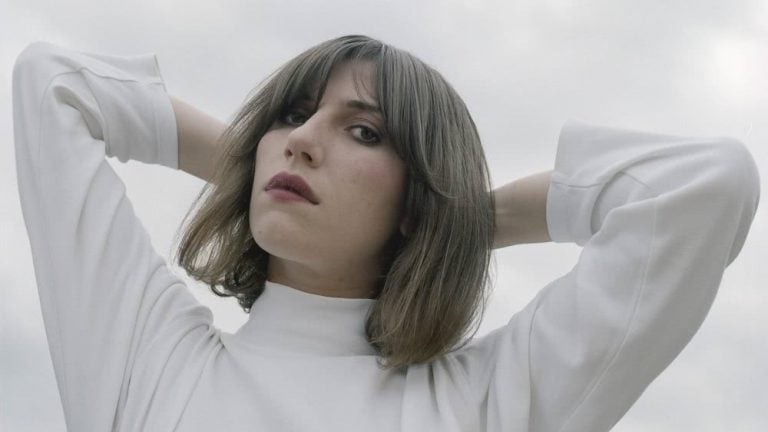The name Aldous stems from the words “old” and “noble”. It’s fitting, really: while only 27, Hannah Aldous Harding speaks and writes like someone in the late stages of their artistry. Her lyrics concern an impassioned, almost debilitating way of life — “I won’t stop turning until I’m twisted” she barks on ‘Living The Classics’ – and a friend once asked her the question, “Why do you have to live so hard?”
“That question was a [mostly] accurate description of how I tend to be as a person,” Harding explains. “I’m either very, very sad and hopeless and angry or I’m elated and full of love and really easy to get along with. But the middles are very difficult – I don’t exist there very long. Not many people know that about me.”
Born in Auckland to musicians, she’s become the poster-woman for the gothic folk genre, but her new record Party proves to be much more expansive than that. Released earlier this year, its full to the brim with her many voices; the result of years of hard work carefully carving her vocal tone into new shapes, allowing Harding to tell the record’s tales with detail and emotional accuracy.
She croons full, low tones in ‘Imagining My Man’, moves to harmonious, heart-piecing shrieks in the titular ‘Party’, and lets off a series of whirring murmurs in ‘What If Birds Aren’t Singing, They’re Screaming’. “Consistency … is not something I worry about. Being earnest: I don’t understand what that means. I’m not insecure about being lots of different things at once.”
I’m either very, very sad and hopeless and angry or I’m elated.
The visual aspect of her performance is often as magnetic as her sound(s). While performing ‘Horizon’, she frequently stands and opens her arm to one side of the room while singing “Here is your princess”, and then slowly moves to the opposite for the other: “and here is your horizon”.
Not that Harding means to make her songs so literal. She’s often reluctant to give away what her lyrics mean to her, and when people get it right, she’s not always pleased to hear so.
“It’s incredibility narcissistic to become so excited when someone else thinks the way [you] do,” she says. “That’s the fucked up thing. I mean, sometimes you’re happy people get it, sometimes you’re upset people get it and sometimes you just don’t care. That’s the nature of [sharing your music]. It changes every day – we’re seasonal beasts.”
Watching her face as she performs, Harding sometimes comes to resemble a contemporary version of Edouard Manet’s 1863 painting Olympia; she’s strikingly defiant, her glare holding her audience. “When I play, I’m not like, ‘Oh, I hope they like it,’” Harding says. “Well, not anymore anyway. It’s like, ‘Am I playing as well as I can?’
“That [glare I do] is probably just a little bit of security that I have amongst all the fragility people keep talking about … I think that when you’re performing such a supposedly delicate, intimate collection of songs you should have control of your audience. Well, you should at least make sure that they know that you don’t actually owe them anything.”
Harding is unafraid of being a little bit terrifying. Her eyes roll into the back of her head and her lips turn down into a snarl; she makes a slow side-to-side shake of the head between refrains, all that contorting along her to reach diverse tones and activate distinct flourishes in her voice. “Well, it’s funny,” she says. “If you watch really closely, you can see that that’s what I’m doing.
“Sometimes I try not to do it and look different because I get sick of seeing photos of myself over that awful white [Godin] guitar. I don’t like standing up and playing the guitar. I did it once for some gigs in New Zealand to give it more of a confident band-feel… I felt strangely feminine in a way that I don’t enjoy.
“I feel like I’m floating when I stand up. I don’t feel grounded. I’ll tell you what I do when I sit in my room and I’m practising: I hunch over [my guitar] and look like Danny DeVito as the Penguin.”
Harding’s had a big year: she’s toured non-stop throughout the UK and the USA; performed at Green Man Festival; played sets on KEXP and NPR’s Tiny Music Desk; and put on an unforgettable show on Jools Holland’s Later…, all while working on her third album. It all comes down to creating work she admires and respects. “It could easily go the other way if you don’t believe in what you’re doing,” Harding says.
What’s clear now is that she’s not quite ready to fully discuss the content of Party. “The thing is, maybe when I’m 45 and sober and I’m doing my comeback record ’cause I’ve pulled my shit together; when I’ve dyed my hair red and I’m wearing leopard print and all that, I’ll be willing to talk about where all this shit that people find so fascinating comes from.
“But this is album two. I’m 27 and I’ve still gotta like, work out my own secrets myself. I don’t wanna be blast randomly all over the place, you know. This is a business of mystery and longevity; of keeping things interesting.”
Aldous Harding plays the Magic Mirrors Spiegeltent on Thursday January 25.


































